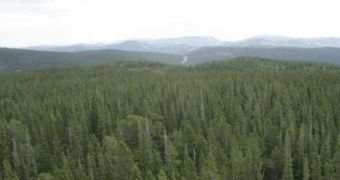Trees have been known for a long time to be one of the most important carbon dioxide “sponges” in the world, next to oceans and exposed volcanic rock. Climate scientists have been basing their studies and climate models on the faith that the world's forests can absorb a certain amount of CO2 each year, but it would seem that they were wrong to do so. According to new investigations, the trees appear to be getting more and more inefficient at soaking up the devastating greenhouse gas, which is nothing but trouble to nations under the threat of floods and desertification.
“Our findings contradict studies of other ecosystems that conclude longer growing seasons actually increase plant carbon uptake,” University of Colorado in Boulder (UCB) former graduate student Jia Hu explains. The expert worked in the Ecology and Evolutionary Biology Department, and also enlisted the help of experts in the Cooperative Institute for Research in Environmental Sciences, or CIRES, at UCB. The direct consequence that these conclusions imply is that CO2 concentrations may actually be growing faster in the atmosphere.
In addition to more carbon dioxide being emitted by power plants, industries and vehicles, it would appear that atmospheric concentrations also increase. The causes may appear separate at first, but experts reveal that it's human activities and pollution that caused global warming in the first place, and also made the trees incapable of soaking up the greenhouse gas. In addition, scientists say, the sheer number of trees that existed in the world's forests was one of the main defenses that we had against the devastating effects of climate change. But, as we cut the woods down, more and more of these effects will be heading our way, experts add.
In its study, the UCB team discovered that a large number of tree species were dependent on snowmelt water for their growth and abilities to convert CO2 into biomass. But investigations around the US have demonstrated that most trees now collect their water from rain, which significantly reduces their conversion rates. “Snow is much more effective than rain in delivering water to these forests. If a warmer climate brings more rain, this won't offset the carbon uptake potential being lost due to declining snowpacks,” CIRES Fellow Russell Monson concludes. Details of the work will appear in the upcoming, February issue of the scientific journal Global Change Biology.

 14 DAY TRIAL //
14 DAY TRIAL //